|
|
|
Sort Order |
|
|
|
Items / Page
|
|
|
|
|
|
|
| Srl | Item |
| 1 |
ID:
104383
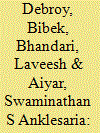

|
|
|
|
|
| Publication |
New Delhi, Academic Foundation, 2011.
|
| Description |
75p.
|
| Standard Number |
9788171888726
|
|
|
|
|
|
|
|
|
|
|
|
Copies: C:1/I:0,R:0,Q:0
Circulation
| Accession# | Call# | Current Location | Status | Policy | Location |
| 055978 | 330.954/DEB 055978 | Main | On Shelf | General | |
|
|
|
|
| 2 |
ID:
182668


|
|
|
|
|
| Summary/Abstract |
This article posits that free-market institutions and practices reduce economic distortions that provide rents for underground organizations, which ultimately form criminogenic environments. Rents from market distortions provide ‘lootable income’ that feeds ‘criminal organizations’, which rely on violence for enforcement of contracts. Using an index of economic freedom, this study contrasts several relevant measures of political freedoms, political discrimination of individuals and groups, and measures of equal access to state ‘goods’ as proxies for political legitimacy and discrimination on the homicide rate. Fixed effects regression results suggest robustly that economic freedom, not political legitimacy, inclusive politics, or state capacity, reduces the homicide rate, results that are stubbornly significant and substantively large. The basic results are robust to a barrage of model specifications, different sample sizes, and estimation strategies, including instrumental variables analysis. The evidence suggests that unusually high homicide rates might be based in quotidian organizational activities related to ‘illegal’ markets rather than to political grievance-based explanations relating to relative deprivation and political legitimacy. Countries wishing to encourage growth-promoting policies need not fear higher levels of interpersonal violence based on various arguments linking free-market policies to societal disarray.
|
|
|
|
|
|
|
|
|
|
|
|
|
|
|
|
| 3 |
ID:
090136
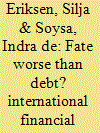

|
|
|
|
|
| Publication |
2009.
|
| Summary/Abstract |
Some report that human rights are likely to be violated when poor countries sign up to structural adjustment programmes (SAPs). These violations apparently occur because ordinary people revolt against the neo-liberal policies that SAPs push. This study examines the effect of the actual flow of finances from the World Bank and the IMF, holding constant all other bank-based financial flows, on government respect for human rights. The authors find that pay-in periods are beneficial for human rights, whereas loan dry-ups correlate with violations. Loan dry-ups are likely to occur because of noncompliance with SAPs rather than implementation, since the international financial institutions (IFIs) release loans in tranches to solve the time inconsistency problem. The overall level of indebtedness is robustly related to human rights abuses, but the higher the stock of debt owed to IFIs relative to total debt, the lower the human rights violations. Accumulating debt to IFIs, thus, seems to improve the level of human rights. Additionally, a higher government consumption to GDP ratio reduces human rights, a result that does not suggest that governments that are capable of commanding a higher share of the country's wealth are less likely to face threatening social dissent. Moreover, a proxy for neo-liberal policies, the index of economic freedom, correlates strongly with better human rights. These results do not square well with the view that neo-liberal policy reforms and the attendant austerity measures drive dangerous dissent.
|
|
|
|
|
|
|
|
|
|
|
|
|
|
|
|
| 4 |
ID:
104841
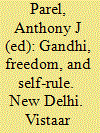

|
|
|
|
|
| Publication |
New Delhi, Vistaar Publications, 2000.
|
| Description |
ix, 156p.
|
| Standard Number |
8178291886
|
|
|
|
|
|
|
|
|
|
|
|
Copies: C:1/I:0,R:0,Q:0
Circulation
| Accession# | Call# | Current Location | Status | Policy | Location |
| 056118 | 954.035092/PAR 056118 | Main | On Shelf | General | |
|
|
|
|
| 5 |
ID:
113757
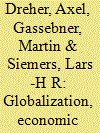

|
|
|
|
|
| Publication |
2012.
|
| Summary/Abstract |
Using the KOF Index of Globalization and two indices of economic freedom, the authors empirically analyze whether globalization and economic liberalization affect governments' respect for human rights in a panel of 106 countries over the 1981-2004 period. According to their results, physical integrity rights significantly and robustly increase with globalization and economic freedom, while empowerment rights are not robustly affected. Due to the lack of consensus about the appropriate level of empowerment rights as compared to the outright rejection of any violation of physical integrity rights, the global community is presumably less effective in promoting empowerment rights.
|
|
|
|
|
|
|
|
|
|
|
|
|
|
|
|
| 6 |
ID:
177150
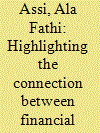

|
|
|
|
|
| Summary/Abstract |
This study explores the association that financial development, economic freedom, and the price of gasoline had with gasoline consumption in 28 countries with the highest economic freedom for the period 1996–2017. The ARDL analysis methodology was used to construct a heterogeneous dynamic panel to test the panel data. The Westerlund panel cointegration test was then performed to determine if the factors were cointegrated. Finally, we used the Dumitrescu-Hurlin panel causality test in order to develop effective policies. The results state that both financial development and the price of gasoline play an essential role in reducing the consumption of gasoline. Additionally, economic freedom is closely related to an increase in gasoline consumption. By employing the variable of the Global Financial Crisis (GFC), the robustness test shows the negative and statistically significant effect of the latter on gasoline consumption and confirms the main findings. Therefore, the GFC played a crucial role in changing the economic plans of the countries with high levels of economic freedom. This suggests that these countries should reinforce financial development to generate green innovations. Further important policy implications for the 28 countries with the highest economic freedom are provided at the end of the paper.
|
|
|
|
|
|
|
|
|
|
|
|
|
|
|
|
| 7 |
ID:
160209
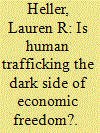

|
|
|
|
|
| Summary/Abstract |
Economic freedom has increased living standards worldwide. Concurrent with such gains are rising concerns about potential human costs associated with free markets. This paper uses data on human trafficking and anti-trafficking policies, in conjunction with a measure of economic freedom, to examine whether free markets exacerbate or attenuate the incidence of human trafficking and policies designed to combat it. We do not find evidence suggesting that economic freedom is associated with human trafficking. In addition, our results suggest that economically free countries are more likely to enact and enforce policies to fight human trafficking.
|
|
|
|
|
|
|
|
|
|
|
|
|
|
|
|
| 8 |
ID:
144998
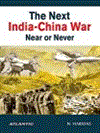

|
|
|
|
|
| Publication |
New Delhi, Atlantic Publishers and Distributors (P) Ltd, 2016.
|
| Description |
x, 626p.pbk
|
| Standard Number |
9788126922116
|
|
|
|
|
|
|
|
|
|
|
|
Copies: C:1/I:0,R:0,Q:0
Circulation
| Accession# | Call# | Current Location | Status | Policy | Location |
| 058652 | 355.033554051/HAR 058652 | Main | On Shelf | General | |
|
|
|
|
| 9 |
ID:
147629
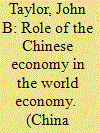

|
|
|
|
|
| Summary/Abstract |
In this paper I first review the amazing progress that free market economic reforms have brought to the Chinese people after years of central control and suppression of markets. Thanks to greater economic freedom, economic growth increased sharply and hundreds of millions of people have been removed from poverty. By all accounts, however, economic freedom in China has a long way to go. The U.S. perspective should be that these market reforms continue. These further reforms toward economic freedom and economic growth in China will be beneficial to the United States. Such reforms would include a greater transparency about the monetary policy strategies, more openness of the capital accounts and less exchange rate and stock market intervention. Such economic reforms should be welcomed and encouraged by the United States and other countries.
|
|
|
|
|
|
|
|
|
|
|
|
|
|
|
|
| 10 |
ID:
123416
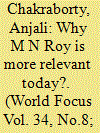

|
|
|
|
|
| Publication |
2013.
|
| Summary/Abstract |
In the present condition of our country, it is gradually felt by the thoughtful citizens of India that we need an alternative meaning of living and achieving the desired objectives of human life. We are fortunate that we have Manabendranath Roy (M.N.Roy), a gifted personality, a philosopher revolutionary, who deeply thought for this 'alternative' sixty five years before anticipating the demoralization of party-politics embedded in the party system and intellectual stagnation what we are facing today.
|
|
|
|
|
|
|
|
|
|
|
|
|
|
|
|
| 11 |
ID:
130516
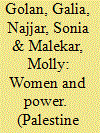

|
|
|
|
|
| Publication |
2011.
|
| Summary/Abstract |
Golan: I think we all agree that we need to find ways that women can be more power full, and this can be anywhere from economic freedom in the household all the way up to participation in decision-making. The question is: What are the best ways to do this'? I think economic independence is one way in which women can begin to assert themselves and be able to at least stand on their own. not necessarily in terms of acting independently outside the home or on their own, but rather in terms of being able to be a full person. vis-a-\='is the other people within the household, whether a husband or a brother or a Father. It begins there, and then we must look for ways to extend this so that women may have an actual role in decision-making. starting from the home and continuing all the way up to government.
Najjar: I would completely agree with you if this were under normal circumstances, perhaps under a real democracy. My concern is more in terms of wait has been happening in an environment of ongoing occupation and annexation. Whereas the household is a very important component. the largest component is that women are continuously living under a paradigm of oppression and lack any forms ourself determination, access, mobility, freedom of expression. identity or cultural activity. There is a little bit of leeway here and there, but I do not see how women can reach any type
|
|
|
|
|
|
|
|
|
|
|
|
|
|
|
|
|
|
|
|
|